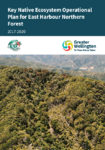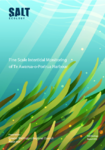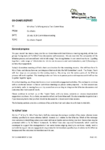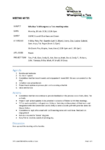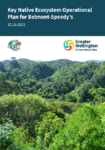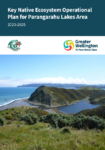-
Key Native Ecosystem Operational Plan for East Harbour Northern Forest 2017-2020
The Key Native Ecosystem (KNE) Programme seeks to protect some of the best examples of ecosystem types in the Wellington region by managing, reducing, or removing threats to their values.…
alarm Published 01 Aug 2020 -
Fine Scale Intertidal Monitoring of Te Awarua-o-Porirua Harbour 2020 Survey
Sediment contained low and ecologically insignificant levels of trace metal contaminants, total organic carbon and nutrients; however, despite these chemical indicators of trophic state suggesting good ecological health, the sediment…
alarm Published 01 Aug 2020 -
-
Whaitua Te Whanganui-a-Tara Committee Co-chairs Report/Monday 20 July 2020
TO: Whaitua Te Whanganui-a-Tara Committee
FROM: Co-chairs
DATE: 20 July 2020 Committee meeting
TOPIC: Co-chairs’ Reportalarm Published 20 Jul 2020 -
Whaitua Te Whanganui-a-Tara Committee Workshop Notes/Monday 20 July 2020
SUBJECT: Whaitua Te Whanganui-a-Tara Committee Workshop Notes
WHEN: Monday 20 July 2020, 12.30-3pm
WHERE: GWRC Council Chambers and Zoomalarm Published 20 Jul 2020 -
-
Key Native Ecosystem Operational Plan for Belmont-Speedy's 2018-2021
The Key Native Ecosystem (KNE) Programme seeks to protect some of the best examples of ecosystem types in the Wellington region by managing, reducing, or removing threats to their values.…
alarm Published 01 Jul 2020 -
Key Native Ecosystem Operational Plan for Parangarahu Lakes Area 2020-2025
The Key Native Ecosystem (KNE) Programme seeks to protect some of the best examples of ecosystem types in the Wellington region by managing, reducing, or removing threats to their values.…
alarm Published 01 Jul 2020 -
Restoring natural heritage
The Key Native Ecosystem (KNE) Programme seeks to protect some of the best examples of ecosystem types in the Wellington region by managing, reducing, or removing threats to their values.…
alarm Published 01 Jul 2020 -
